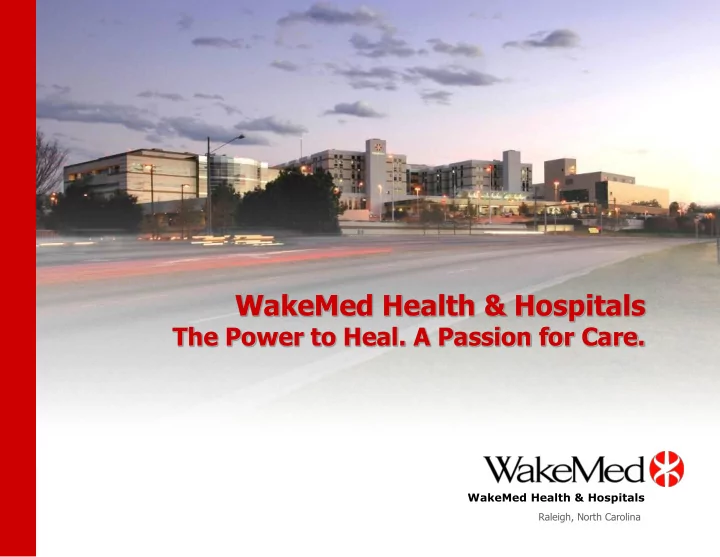

WakeMed Health & Hospitals The Power to Heal. A Passion for Care. WakeMed Health & Hospitals Raleigh, North Carolina
Traumatic Brain Injury December 4th, 2012 Laurie Leach, Ph.D., FACPN Director of Neuropsychology Program Director, Brain Injury Rehabilitation System WakeMed Health & Hospitals
Learning Objectives 1- Define traumatic brain injury (TBI) 2- Define Post-Traumatic Stress Disorder (PTSD) 3- Compare/Contrast TBI/PTSD 3
Traumatic Brain Injury Traumatic brain injury is an insult to the brain, not of a degenerative or congenital nature but caused by an external physical force, that may produce a diminished or altered state of consciousness, which results in an impairment of cognitive abilities or physical functioning. It can also result in the disturbance of behavioral or emotional functioning. These impairments may be either temporary or permanent and cause partial or total functional disability or psychosocial maladjustment. • Official Definition per Brain Injury Association of America 4
Traumatic Brain Injury • Insult to the brain caused by an external force • Results in change in physical, cognitive, behavioral or emotional functioning 5
Traumatic Brain Injury • Open versus Closed injury • Level of severity can vary – Mild (also commonly referred to as a concussion) – Moderate – Severe 6
Mild TBI • Complicated: may have damage that shows up on scan of the head such as bleeding • Uncomplicated: negative head scan, often referred to as a concussion 7
Primary Versus Secondary Injuries from Brain injury Primary Injuries: occur at time of impact • Skull fracture • Contusions/bruising • Bleeding • Diffuse Axonal Injury Secondary Injuries: evolves over hours or days • Swelling • Increased intracranial pressure • Infection • Seizures • Lack of oxygen 8
9
Functions of the Brain • Physical abilities Movement, strength, balance, posture, etc. • Personality characteristic patterns of thoughts, feelings and behaviors that make a person unique • Behavior A response to an action, environment, person, or stimulus • Emotions Feelings related to an experience • Cognitive abilities Intellectual skills, memory, language, spatial, executive 1 0
TBI Symptoms Physical Cognitive/Behavior Emotional Headaches Memory loss Anxiety Blurred or other Inattention Depression visual deficits Decreased limb Impulsivity Lability strength or weakness Balance difficulties Disinhibited Irritability Decreased Confused thinking Sleep changes coordination Sensitivity to Executive skills deficits light/noise Fatigue Spatial difficulties Nausea/Vomiting Language difficulties 1 1
Recovery from TBI • Moderate to Severe TBI likely will require months or years of rehabilitative services • Mild TBI: typically see very good recovery over time with small subset who have symptoms that linger 1 2
Mild TBI • Usually no marked physical deficits • Dizziness • Headaches • Variable memory and attention • Blurred or double vision • Fatigue 1 3
mTBI and military • Increased focus on brain injury- combat and blast related • Military actively working to study brain injury and treat • Majority are mild in severity 1 4
1 5
1 6
Diagnostic Dilemma • mTBI set of symptoms, no absolute test • Can overlap with other symptom presentations • Diagnosis: causal event, temporal sequence, symptom presentation 1 7
DoD Process for Identifying/Treating mTBI • Pre-Deployment: neurocognitive baseline • In theater: re-assess neurocognition • Post-Deployment: 4 questions about tbi, lead to f/u assessment • Vets: screened for mild tbi, trigger to ask questions dependent upon where served 1 8
Post-Traumatic Stress Disorder (PTSD) • Diagnosable anxiety disorder • Prevalent disorder for variety of reasons (car accident, violence, abuse, torture, rape, etc) • Combat exposure one trigger • 15% of service members decreased functioning due to PTSD (per DoD) vs 8% of adult population in US 1 9
DSM-IV-TR • Diagnosed if both of following occurred: – Experienced, witnessed or confronted event in which actual or threatened death or serious injury to self or others – Response involved intense fear, helplessness, or horror 2 0
PTSD Diagnostic criteria continued • Re-experience event through – Recurrent, intrusive thoughts of the event – Recurrent dreams – Acting or feeling if it is recurring – Distressed by triggers of event – Physiological reactivity to reminders of event 2 1
PTSD Symptoms • Persistent avoidance of stimuli associated with event and numbing of responsiveness • Persistent symptoms of increased arousal • Duration of symptoms more than 1 month (otherwise called Acute Stress Disorder) • Causes clinically significant distress or impairment in social, occupational, or other areas of functioning 2 2
Symptoms of PTSD Physical Cognitive/ Emotional Behavioral Fatigue Withdrawal Anxiety or Panic Vomiting or Nausea Emotional Outbursts Guilt Chest tightness Restlessness Fear Difficulty breathing Loss of Interest Denial Headaches Increased alcohol Irritability use Weakness Memory difficulties Depression Poor attention 2 3
PTSD overview • Recalibrate to lower threshold for fear response • Prevention is key: immediate response, applying Psychological First Aid • Treatment Cognitive Behavioral Therapy (CBT) Exposure based treatments medications 2 4
mTBI vs. PTSD Symptoms of mTBI Symptoms of PTSD Fatigue Fatigue Irritability Irritability Depression Depression Cognitive (memory and Memory and attentional attention) issues 2 5
New methods to help identify brain injury • Sensors in combat helmets • Biomarkers in blood • Eye movement tracking • Challenge: research suggests structural, endocrine, and neurochemical changes in both PTSD and brain injury 2 6
Questions? 2 7
WakeMed Health & Hospitals Raleigh, North Carolina 2 8
Recommend
More recommend